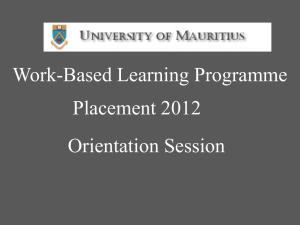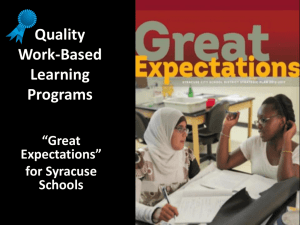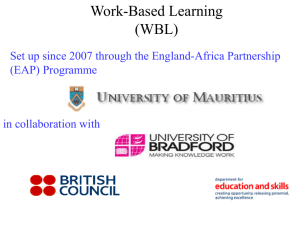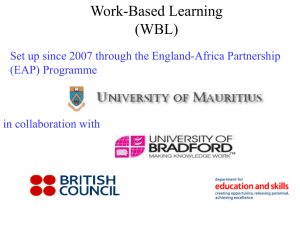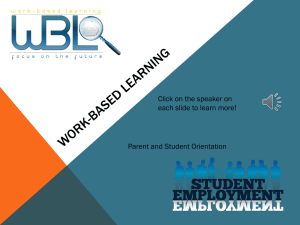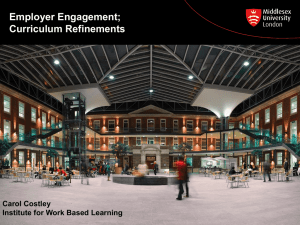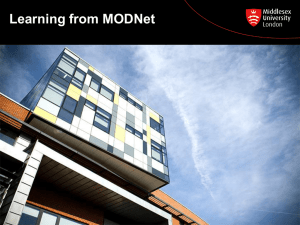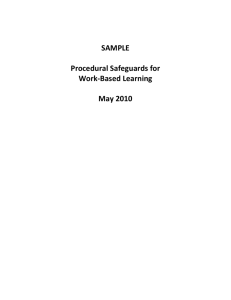Employers Need and Evaluation Survey 2011
advertisement
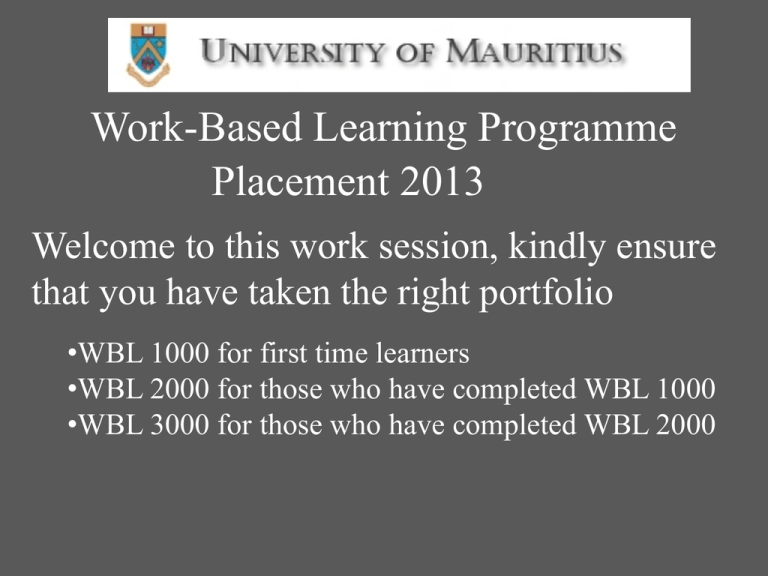
Work-Based Learning Programme Placement 2013 Welcome to this work session, kindly ensure that you have taken the right portfolio •WBL 1000 for first time learners •WBL 2000 for those who have completed WBL 1000 •WBL 3000 for those who have completed WBL 2000 Work-Based Learning A programme that aims to prepare you for the world of work Objectives •to acquire practical skills and knowledge; •to develop the right attitude; •to transfer knowledge obtained at the University to the work place; •to work alongside with professionals in their respective field of practice; •to make you fit for purpose and practice; •to develop a work ethics culture. Work-Based Learning • The general purpose is to provide students with work experience and with long term educational and vocational benefits A.Stern (1997) •Academic Achievement remains a vital component for graduate success in the labour market •Employers increasingly looking for “Something Extra” which makes a candidate stand out from the crowd Work-Based Learning •Something Extra : skills experience of work ability to function •After Graduation Qualification Look for Job No Work Experience Interviews No Job Work Experience ??? Employers Need and Evaluation Survey 2011 • Findings -Employers find that our graduates are too bookish -Recommend more interaction with organisations to help UoM students have the balance between theory and practice. -Graduates find that their studies tend to be focused on the theory with limited or no practical applications -In general, the UoM graduates have rated their learning experience as ‘Satisfactory’ although some have highlighted the limited job prospects in particular fields. Employers Need and Evaluation Survey 2011 1 (%) Degree of Importance Very Low Very High 2 3 4 (%) (%) (%) 5 (%) Average Rating Technical skills needed for the job 0.4 1.6 12.8 49.2 36.0 4.19 Adequacy of knowledge in the field 3.6 6.4 16.0 40.0 34.0 3.94 Ability to recognise and solve problems on the job Capacity to work with minimum supervision 6.8 1.2 18.4 36.4 37.2 3.96 0.4 2.0 24.0 38.0 35.6 4.06 Written communication/ Report writing skills Verbal communication/ Presentation skills 2.0 19.2 49.2 29.6 100.0 4.06 - 4.0 20.8 35.2 40.0 4.11 Teamwork Time management Decision making ability Enthusiasm on the job Initiative needed to fully complete tasks/ Pro-active Remain accountable for actions taken 4.0 7.6 0.4 1.6 6.8 2.4 2.0 4.0 8.8 21.2 20.0 24.4 22.8 14.4 35.2 34.4 46.0 30.0 36.4 32.8 35.6 27.6 42.8 38.8 3.86 3.88 3.99 4.11 4.02 6.8 1.2 16.4 37.2 38.4 3.99 - 3.6 2.8 27.2 28.8 41.6 48.4 27.6 20.0 3.93 3.86 Skills and Attributes Computer and numeracy skills Leadership skills Employers Need and Evaluation Survey 2011 -Other Skills & Attributes employers would like to see in UoM graduates Skills and qualities Creativity / Innovation Interpersonal skills Practical approach Adaptability & Flexibility Planning & Organisation Maturity Professionalism Dedication/ Commitment Use of software Critical thinking Punctuality Responsibility/ Reliability Extrovert No. of respond. 21 21 19 16 16 15 14 13 12 9 8 8 7 Skills and qualities Confidence Customer-focus Counselling Result Oriented Integrity Curiosity Humility Multicultural sensitivity Patience Research skills Ambition Multi-skilled Other No. of respond 6 5 5 4 4 3 3 3 3 3 3 2 11 Employers Need and Evaluation Survey 2011 -Employers’ satisfaction with UoM graduates Employers Need and Evaluation Survey 2011 Comparison between overseas graduates and UoM graduates UoM graduates are Number of responses % respondents Less Good 44 38.9 No different 37 32.7 Better 16 14.3 No comparison 10 8.8 Don’t Know 6 5.3 Employers Need and Evaluation Survey 2011 Aspects on which UoM graduates and overseas graduates differ Inadequacies Lack practical know-how Are not pro-active Are not open-minded Are too academic/ bookish Are not dynamic Lack international exposure Lack communication skills Lack maturity Lack professionalism Lack interest in the job Are shy and introvert Lack interpersonal skills Lack confidence Number of responses 24 18 18 18 15 15 13 13 13 11 10 9 7 Employers Need and Evaluation Survey 2011 Importance of Work Placement Employers Need and Evaluation Survey 2011 Time taken for UoM graduates to obtain a job Work-Based Learning UNIVERSITY Setting WORK PLACE Setting Undergraduate Degree (BSc/BA/BEng) Core Technical Skills Postgraduate Degree (MSc/MA) Work (Knowledge & Skills) Postgraduate Degree (PhD) Work (Knowledge & Skills) Work-Based Learning Work-Based Learning My Benefits • Integrate in a real work setting • Work with professionals • Acquire practical skills • Share my knowledge with others • Create my own network (contact) • Ideas for final year project/dissertation • Recent Research proves that students undertaking placement perform better in their studies than those who do not. Ref: Placements and degree performance: Do placements lead to better marks, or do better students choose placements? Driffield, N.L, Foster, C.S., and Higson, H.E,Aston University, Birmingham, 2011 WBL UNIT Link Tutor STUDENT INDUSTRY Mentor Module Weightage Number of Credits PreRequirement Placement Period WBL 1000 1 2 None 6-8 weeks WBL 2000 3 2 WBL 1000 6-8 weeks WBL 3000 5 2 WBL 2000 6-8 weeks •Preparatory Session •Mentors’ Induction at work setting •Link Tutor’s Visit •Assessment & Portfolio Submission • To engage fully during planned Work-based Learning in order to achieve the stipulated learning outcome; • To conform to the regulations and policies of the placement organisation; • To maintain the confidentiality of any sensitive information concerning the organisation and its business; • To adapt to the placement organisation’s culture, methods, leadership and programmes; • To consult the supervisor in the event of any problems or concerns related to the Work-based Learning; • To notify the mentor of the placement organisation and University, in advance where possible, of any absences or lateness from scheduled work hours in line with the University protocol; • To be an ambassador of the University when gaining Work-based Learning experience. • Assess on seven areas of core competencies (1) Communication (4) Problem Solving (2) Team Working (5) Using and Applying Numbers (3) Improving Own Learning (6) Using Information Technology and Performance (7) Professional Development (Detailed in module practice document ) • Mentor will make first assessment at mid-point Formative Assessment Provide Feedback • Mentor will make final assessment at the end of the training period Summative Assessment (Confidential) Final Result • All evidences of learning outcome achieved have to be recorded by the student and sign by the Mentor and the Student • Link Tutor’s Visit and Comments to be recorded and signed by the Link Tutor and the Student • Portfolio must be completed and submitted by students to the WBL Office at the Registry ,CPDL at latest Monday 22 July 2013 • Result will be out after the next examination board • Portfolio will be kept at the WBL Office • Portfolio remains the property of the University of Mauritius Communication -Demonstrates an understanding of the communication systems which are in place in an allocated work setting Answers -Must relates how the people in the organisation communicate. -How information/approval are passed from mgt to staff ? -How staff are kept informed? Sample In a secondary school There is direct interaction among the teaching staff. Departmental meetings are organised where the HoD updates his staff about mgt decisions. Issues & concerns that cannot be handled by the HoD are referred to the Deputy Rector. Teaching staff communicates to the Rector through their HoD. Urgent and important mgt decisions are sent directly to the staff through formal circulars. Students, on their side, liaise directly with their Form Master. Communication - Identifies the different types of communication channels and modes/tools which are utilised in allocated work setting Answers -Must identify the comm. channels in place among the different categories of personnel . -What tools are used? -E.g. how mgt reaches the mass of students, the teachers and vice-versa Sample In a secondary school At La Gaulette SSS, numerous types of communication channels and tools are utilised: notice boards, departmental meetings, morning assembly, mark book, order book, attendance card, student journal, report book. There is normally a two-way communication within people of the school. [A.Amic, BA(Hons) French] Communication - Explains how the different sections/units/departments within an allocated organisation/work setting communicate with each other Answers -Must reflect the coordination among the depts. -Identify approval methods, info. that circulate, movement of files Sample In a hotel Where I am posted at Le Touessrok, three departments work in coordination namely Public Relation, Sales and Marketing. These three departments communicate mainly through email, telephone, fax and also face-to-face (verbal comm). Sometimes if an issue is not clear, face-to-face communication is essential to clarify the issue. [T. Azeghee, BSc(Hons) Marketing Mgt] Communication -Engages in defined aspects of communication interactions within an allocated work environment Answers -Must state how you personally engaged yourself. -Identify with whom you are working mostly everyday Sample In an NGOs I attended regular meetings where I have the opportunity to discuss my views with members of the staff. In addition, my mentor provide support on my observation and report through face-to-face interactions. I also worked with the administrative staff on an ongoing basis to better understand the concept of letters, reports and projects of the organisation. Furthermore, I have provided advice to children by staying in the shelters and doing individual & group activities with them. [T. Boodhoo, BSc(Hons) Psychology] Team Working -Describe the mission, philosophy and goals of an allocated organisation/work setting Answers -Must state clearly the mission and goals Sample In an NGOs The mission of CEDEM is to provide a better future through quality education to the children of Mauritius. Its action and philosophy are based on seven main principles: the importance of family, quality education, effective pedagogy, respect of human rights, training, professionalism and team working. CEDEM’s main goals are to promote and protect children rights, to rehabilitate children living in difficult circumstances and to sensitize and provide support as well as counselling to parents and the general public. [T. Boodhoo, BSc(Hons) Psychology] •How should I dress? -Formal on the first day as you would go for your first day at work -Same as the other professionals -Some work settings have uniforms -Avoid jeans, piercing, disco hair styles •What if I am absent from placement? -For one or two days, inform the mentor -More than two days, inform the mentor and the WBL Unit -Provisions should be made with the mentor for replacing missing days in case of more than two days missed -Will be penalised for absences without justification •What if I submit the portfolio late? -University regulations will apply same as for other modules •What if I submit a blank portfolio? -No record of evidence of achievement. Will get “N” as result •What if I do not complete the training, do not return portfolio and do not inform the WBL Unit ? -Will Fail with grade ‘F” •What if my mentor does not complete his part in the portfolio (interview part)? -Student will not be penalised. The interview part is optional. However, it is recommended that mentors perform these so as to ensure proper support of student’s achievement. •What if my mentor does not sign in my portfolio for my attendance and my record of evidence achieved? -This may be interpreted that the mentor cannot endorse that the student was present and has achieved what has been written as evidence. To avoid being penalised, it is imperative that student requests their mentor to sign off for them. •What if no link tutor visit me? -Student will not be penalised. In case there is need, the WBL Unit may contact the mentor for feedback after the portfolio submission •What if the link tutor visit me, but do not fill in his part in my portfolio? -If this is because the student does not have his portfolio or the student is away on the day of the link tutor’s visit, then student must ensure that this part is completed before submitting his portfolio. -In case the link tutor himself requests that he will do it afterwards, then the WBL Unit will handle after portfolio submission. •What if I do not get my WBL result after the next exam board? -You should contact the WBL Unit immediately. This happen particularly for students who have to repeat the year. •I am in my final year of studies, will WBL delay my graduation ? -You will graduate, the WBL result will be approved and therein mentioned in your transcript afterwards. Project Coordinator : Mr. Abdool Mohabuth Placement Coordinator : Miss Maliny Soobrayen Office : Ground Floor, Centre for Professional Development & LifeLong Learning Slides may be viewed on: http://vcampus.uom.ac.mu/wbl as from 05 June 2013
